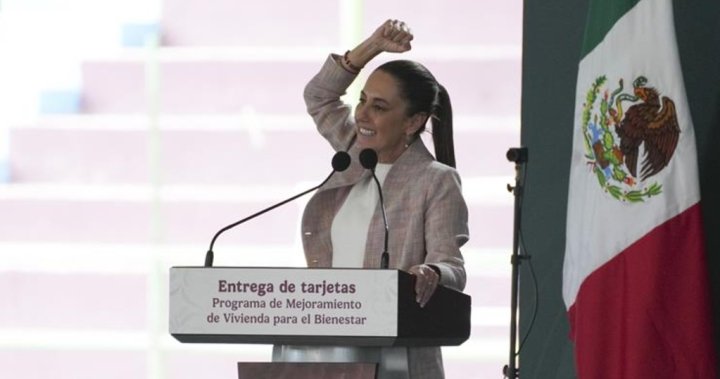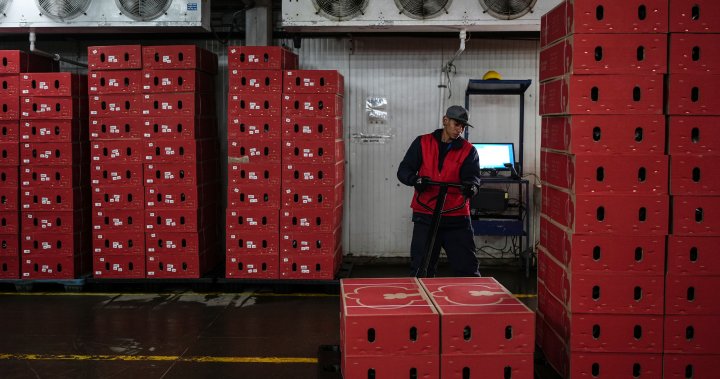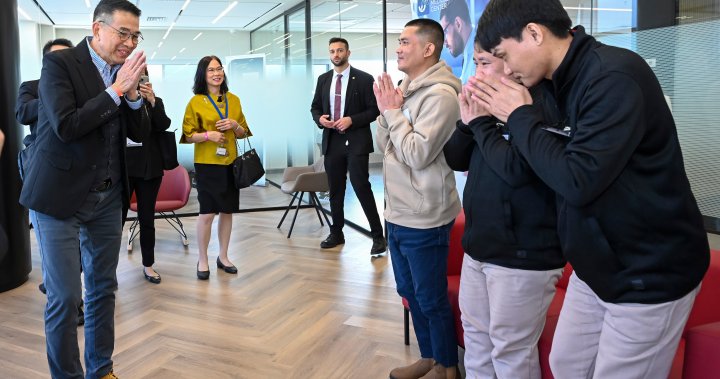Ukraine’s forces have entered Russia. Could it help end the war? – National

As Ukraine continues to claim more territory inside Russia a week after the largest cross-border incursion of the war, several questions remain unanswered — including what the end goal might be.
In the short term, Kyiv says it is seeking to establish a “buffer zone” within the Kursk region, one of several border territories from which Russia has launched missile strikes that have pummelled Ukraine.
But analysts suggest the surprise operation may also be about Ukraine assuring western allies it can still bring the fight to Russia despite being outgunned and outmanned. That could even help push Moscow to the negotiating table on better terms for the Ukrainians, some experts say.
“This has not changed the course of the war, because (the Ukrainians) simply lack military power to do so,” said Andrew Rasiulis, a fellow at the Canadian Global Affairs Institute. “But they can improve their bargaining position.”

Russian President Vladimir Putin has made similar comments, though he and the Kremlin have yet to agree to any ceasefire talks.
Meanwhile, Putin has vowed to push the Ukrainian troops out of Kursk, but days of intense battles have so far failed to oust them.
Ukrainian forces first entered the Kursk region on Aug. 6 from Ukraine’s northeastern Sumy region, appearing to catch both the West and the Kremlin by surprise.
The Russian province is far north of what’s long been established as the front line of the war, the southeastern Donbas region of Ukraine that Russia annexed in the fall of 2022, months after launching its full-scale invasion.
That roughly 1,000-kilometre front line has remained largely deadlocked for well over a year. An attempted Ukrainian counteroffensive last year failed to win back any significant territory, and the military has since struggled through both a dwindling number of soldiers — requiring a controversial conscription law — and a slowdown in military aid from the U.S., its largest western supplier.
In recent months, Russia has been pursuing a concerted push in the Donetsk region, hammering Ukrainian villages and towns with artillery, missiles and bombs and forcing defensive troops to retreat.

That slow but relentless advance has come at a cost. Moscow’s army sustained more than 1,000 casualties a day in May and June as it bore down on Donetsk, according to the U.K. Defense Ministry. But Russia still has a manpower advantage, and it has gained ground one kilometre at a time.
Ukraine, analysts say, was able to take advantage of Russia’s intense focus on the front line and target the relatively poorly guarded Kursk.
Breaking news from Canada and around the world
sent to your email, as it happens.

Get breaking National news
For news impacting Canada and around the world, sign up for breaking news alerts delivered directly to you when they happen.
“It shows Ukraine is still in the fight and they are still capable of strategic surprise and great planning,” said Joseph Varner, deputy director of the Conference of Defence Associations Institute who served as a senior advisor and policy director to former defence minister Peter Mackay.
Ukraine has long complained of being hamstrung in defending itself against Russian missile attacks by U.S. and allied instructions to not use western-supplied weapons to strike territory within Russia’s traditional borders. The U.S. has only allowed limited strikes in territory north of Kharkiv, in Ukraine’s north, to stave off attacks on that densely populated region.
The Kursk offensive, which Ukraine only began to confirm early this week, is another way to bring an end to the cross-border bombardments, Kyiv says.
Ukraine’s top military commander, Gen. Oleksandr Syrskyi, said in a video posted to President Volodymyr Zelenskyy’s Telegram channel Thursday that his forces have since advanced into more than 1,150 square kilometres of the Kursk region, though it was not possible to independently verify that claim.
If true, it would mean Ukraine has captured in just one week almost as much land as Russian forces took — 1,175 square kilometres — between January and July this year, according to calculations by the Institute for the Study of War, a Washington-based think tank.

In the video, Syrskyi said Kyiv’s forces have advanced 35 kilometres into Kursk over the past week and taken control of 82 settlements, believed to be villages and hamlets.
“We are moving forward in Kursk region,” Zelenskyy wrote on Telegram Thursday.
Moscow has sought to downplay the incursion and says Ukraine’s claims are overblown. Still, authorities have evacuated about 132,000 people from the Kursk and neighbouring Belgorod regions and have plans to evacuate another 59,000 more.
Ukrainian troops also took more than 100 Russian soldiers prisoner, Syrskyi said. Zelenskyy said they would eventually be swapped for Ukrainian prisoners of war.
Analysts say the incursion is unlikely to shift the dynamics of the conflict.
“Russia still has numbers on its side,” Varner said, adding it can rely on conscriptions from within the country and pull fighters from less intense areas of Ukraine to send to Kursk without relying on troops from the front line.
The counteroffensive in Kursk may prove to be “brutal,” he added, once those additional forces and weapons arrive.
“We don’t know where these Ukrainian units came from, how strong they are and what their ability is to keep them supplied,” he said. “So we don’t know how long they can hold on.”
That may not matter in the long run. Zelenskyy said Tuesday that the Kursk operation is also meant to lift the country’s spirits after 900 days of war and to make an emphatic statement about Ukraine’s military capabilities.

It’s also possible Ukraine could expand its footprint within Russia. The Belgorod region, which is next to Kursk, declared a regional emergency Wednesday during heavy Ukrainian shelling, with the regional governor announcing evacuations amid the “extremely difficult and tense” situation.
Zelenskyy himself on Thursday hinted at “other actions on the territory of the aggressor state” in his statement Thursday, as well as the need to prepare the “next steps” in Kursk, but did not elaborate.
A Ukrainian Foreign Ministry spokesperson said Tuesday that Kyiv has no intention to occupy the Russian territory it controls.
Rasiulis said Ukraine will continue to use whatever leverage it can take to force Russia to the negotiating table, where he and other analysts say is likely the only place where an end to the war can be achieved.
Zelenskyy has proposed peace talks to be held in November that would include Russia, after the country was not invited to an earlier summit in Switzerland in June. But the Kremlin has said the prospect of talks has been put on a “long pause” by the Kursk operation.
The White House, which says it was not given advance notice by Kyiv of its plans and has been careful not to comment on the operation, has made clear their opinion about how Putin should respond.
“This is Putin’s war,” White House national security spokesperson John Kirby told reporters on Monday. “And if he doesn’t like it, if it’s making him a little uncomfortable, then there’s an easy solution: he can just get the hell out of Ukraine and call it a day.”
—with files from The Associated Press and Reuters








